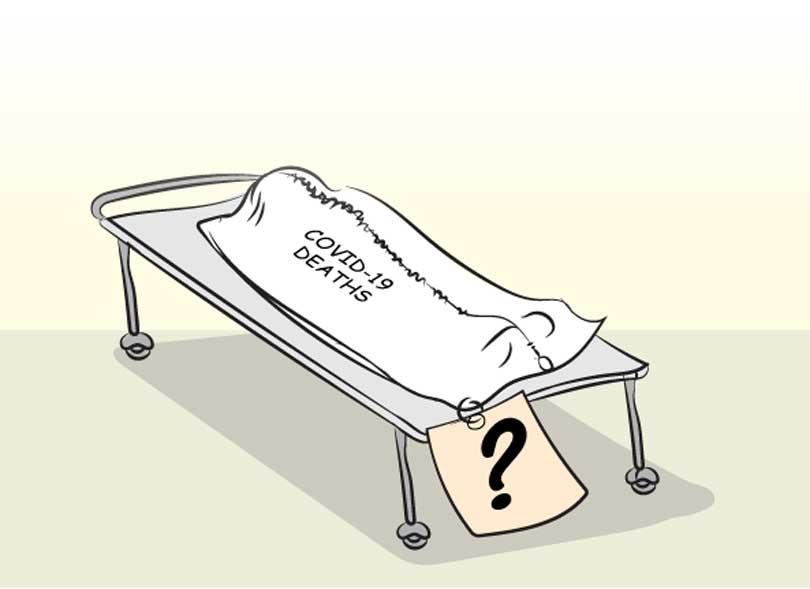Reply To:
Name - Reply Comment

The recent newspaper reports show what a messy situation prevails in hospitals in handling the victims of COVID-19 and the lack of empathy towards the relatives of the victims. An article in the latest issue of our sister paper, The Sunday Times explains the cruel treatment by some employees of some hospitals who solicit bribe from relatives for handling the bodies of their loved ones.
The story also explains how the relatives are sent from pillar to post before getting the body released or issuing the death certificate. This had been dealt with by another article in the Daily Mirror as well, a few days ago. In fact the policy of sending people from pillar to post has been a long-drawn tradition in government institutions including hospitals.
Due to the spread of COVID-19 pandemic, the procedure followed in respect of those died of other diseases also has changed and become more hassled. A lady whose mother-in-law had died of cancer in January had stated the Sunday Times “The attitude of the officials and lack of empathy is unbearable. They seem to forget that people are grieving and in shock and instead send them from pillar to post. The system stinks. The stress of getting her body removed from the house and doing the formalities was sheer hell. There are no protocols. It seems rules are made as they go along.”
It is a well-known fact that COVID-19 is a god-send for some people who handle the patients or contact persons or dead bodies. It seems that a messy situation is favourable for them. We recently heard how some unscrupulous people had set up a plan to heartlessly exploit the stranded Sri Lankan migrant workers, by directing them to hotels to undergo quarantine, without their consent.
Since the outbreak of COVID-19 pandemic, as mentioned in the Sunday Times article, PCR tests on dead bodies in Sri Lanka are conducted out of sight of the relatives. Their outcomes are not always believed. Kith and kin of the victims are not always able to view the bodies, even through plastic bags and at a safe distance. Needless to say that the bodies of COVID-19 victims have to be handled with utmost care, but the procedure followed in most cases is against the guidelines of the World Health Organisation (WHO) and the basic human values.
The situation now in Sri Lanka is that once a person is removed to a hospital by the health workers after being tested positive, the relatives have no assurance whatsoever that they would see the face of their loved one anymore. Imagine the pain of both the patient and his or her kith and kin at the parting. Will the authorities cremate a body of a COVID-19 victim who is a relative of a powerful politician or a senior health worker or a military officer without showing the body to the relatives?
And also this might lead to unnecessary issues and suspicions. When the body of a baby died of COVID-19 was cremated without showing it to her mother recently, some social media activists questioned whether the child was in fact dead. The Expert Committee appointed by the Secretary of Health to look into the possibility of burial of bodies of COVID-19 victims, while recommending both the cremation and burial has also recommended allowing viewing the body by relatives. Although the report of the committee has not been made public, the Chairperson of the experts committee Senior Professor Jennifer Perera in a televised interview a few days ago said that the committee had recommended that four family members should be allowed to view the body of the deceased from a safe distance for a period of five minutes and also a religious leader should be given the opportunity to come to the place of cremation or burial and perform religious rites.
The WHO in its “interim guidance designed for individuals who tend to the bodies of persons who have died of suspected or confirmed coronavirus disease 2019 (COVID-19)” says, “Family and friends may view the body after it has been prepared for burial, in accordance with local customs. They should not touch or kiss the body and should perform hand hygiene after the viewing.” It also says “In contexts where mortuary services are not standard or not always available, or where traditional funeral rituals are required, families and traditional burial attendants can be equipped and instructed in the preparation of bodies for burial or cremation.” It further goes on to say “Any person (e.g. family member, religious leader) preparing the deceased (e.g. washing, cleaning or dressing body, tidying/shaving hair or trimming nails) in a community setting should wear gloves for any physical contact with the body.
In Sri Lanka, nobody, even Muslims, request permission for “washing, cleaning or dressing body, tidying/shaving hair or trimming nails” of a COVID-19 victim. Therefore authorities must view the relatives of those die of the pandemic empathetically.